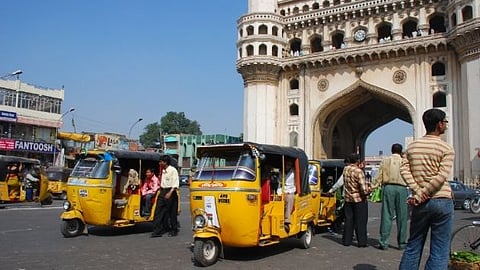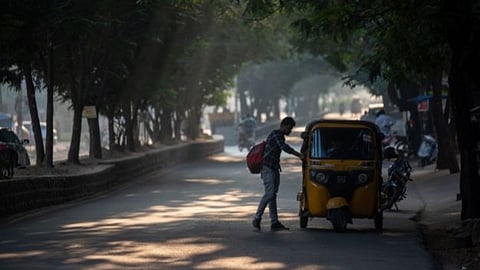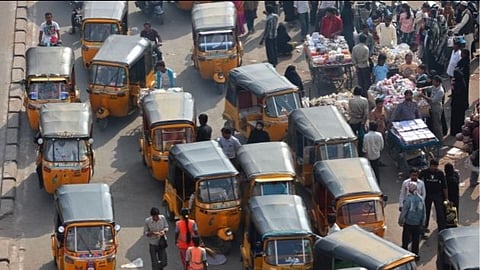The ‘share-auto’ is nothing short of a ride to the heart of “community feeling” in the time of community transmissions aided by the ‘third wave’ of the Covid-19 pandemic. At the busy Habsiguda crossroads in Hyderabad, the capital of Telangana, a throng of local autorickshaw-wallas solicit riders actively every evening. This is the rush-hour frenzy for these three-wheeled autos, also known as tuk-tuks in other parts of Asia. Their black-and-yellow bodies resemble agile bees buzzing away, moving, and darting from time to time, shooting away down the road. Meanwhile, the Hyderabad Metro rail rumbles overhead the crossroads, elevated atop gigantic pillars supporting the rail tracks. Every five minutes, the Metro sends down passengers at its Habsiguda station stopover, stirring the bee nest.
Zen And The Art Of Share-Auto Rides: Pandemic Notes
A life without the hive of share-autos would be doomed for those who do honest labour, keep the human chain buzzing, and let the art of life flourish
‘Share and care’ is an age-old motto, but the pandemic that began in 2020 has seen better or worse. While thousands of migrant workers trudged back home in a great exodus, no help from the authorities reportedly came in the form of food and water, temporary shelter, or medicine and placebos. The well-off watched from their relatively secure apartment-citadels and air-conditioned interiors while the poor homeless, jobless migrant workers walked with blistered feet, starved bellies, and fear-struck faces. Seemingly, it’s the wealthy that mostly came under the virulent attack of the Covid-19 virus in the first and the second waves. Diabetes, obesity, heart conditions, a mix of co-morbidities, and old age were said to be the reasons for this ‘selection’. Even in the experience of the well-off, the share and care attitude appeared to be lacking from the ruling disposition as government hospitals scampered to provide beds, doctors, oxygen cylinders, etc., and private hospitals charged astronomical amounts for the same.
The so-called isolation and ‘sheltering-in’ became such a privileged affair that we have now spent two years and counting attending online classes, meetings, work-from-home appointments, and even entertainment, creative and hobby workshops. Romance too has gone virtual, with lives having been made or broken, and conversations of the heart carried out in ‘emojis’ or GIFs. A friend told me — I being a borderline digital Luddite — ‘ShareChat’ became the other name for sharing, with chatting apps gaining prominence in these times. People hardly shared in person or chatted face to face as before.

Makes me wonder, are we still in the mood for sharing in this high-speed information age? Information itself has become synonymous with sharing but the question is, exactly of what? The moment the word ‘sharing’ is entered into the Google Translate box, the four languages that I opt for yield these results – pan̄cukōvaḍaṁ (Telugu), bantvaara (Hindi), bhaag kora (Bengali), and bhaag-botora (Assamese).
What is instantly noticeable is that none of these words really convey the spirit of ‘sharing’ I’m trying to convey. Those machine-translated words – perhaps ‘machine’ says it all -- work more along the line of division and distribution, often strictly in the economic and business sense. The translation of ‘sharing and caring’, therefore, seems utterly skewed and futile. What is more, even the ‘share’ culture on popular social media sites, e.g. Facebook, simply transliterates the word in the multiple languages that its users speak — “share cheyandi”; “share kijiye”. Will I face the same conundrum with the word ‘care’, I wonder again.
Rae Armantrout perhaps had sensed the meaning of care within the ‘isolation’ we are facing today, syllable by syllable.
Alone in your crib,
you form syllables.
Are you happy when one
is like another?
Add yourself
to yourself.
Now you have someone.
(from “Care”; Rae Armantrout)
How even meanings change when we flip the words in the term “share-auto”.
Auto-Share on the digital highway has come to signify a different kind of sharing altogether. We are able to add posts and images and videos to our primary social media site while simultaneously sharing the same to the other sites we have accounts in. One can safely assume the creators of Auto-Share wouldn’t know the sights, smells, and emotions that are shared in the “share-auto” rides, and most significantly, the human interactions. On the real highways.
Our conditioned minds see artistic and creative inclinations as ‘pure’ or unsullied traits. The arrival of the virus sent most of us privileged writers, artists, and performers scurrying indoors, or seeking sanitized — bottles after bottles of sanitizers alone wouldn’t suffice, we were paranoid for a vacuum-packed existence — transportations or workspaces even when the viral curve somewhat ‘flattened’. Bestselling novelist Richard Crasta looks the other way round at this obsession and insists that "pandemic-grade viruses hate writers, and so do television and news media,” which makes sure “our minds are blank or taken over.” The tyranny of the establishment has found a new weapon. The victims are also artists, poets, thinkers.
In all this hullabaloo, the middle and the upper-middle-class — invariably mostly upper-caste as well — forgot that this was a country of one billion-plus where most people struggled for choices and survival. That in itself was ‘art’ if one may say so. For those millions, a majority of them from oppressed caste backgrounds, the creative aspects weren’t about passing time in privileged bubbles of isolation admiring colours, rhymes, and rhythms, but figuring out employing several methods where share and care came to rest in these dark times that fed the oppressors and opportunists. The privileged disparagingly call it jugaad when they don’t benefit from it; when they themselves milk the benefits, they call it survival trick or shtick, and the like. They even elevate it to the level of art.

Then of course there are more sensitive ones who remember lessons handed down by tradition and heritage. Poet and writer Taseer Gujral recalls that in Punjabi, and in gurbani (sacred compositions by Sikh Gurus), there’s the concept of “wand chhakna”, which comes closer to the spirit of sharing and enjoying with everyone, whether food or any other consumable. “We have the tradition of langar (communal free kitchen) that is one of the manifest meanings of wand chhakna... during the farmers protests, we saw this tradition come alive and further extended to all the necessities, including langars of coolers (during summers), dawai (medicine), sabun (soaps and detergents)... so much so, a whole colony of laborers were being fed and fended for by the farmers,” Gujral says. The pandemic may have kept the rulers and the uncaring from participating in those langars and campaigns, but the sharing of compassion and hospitality was an organic lesson in growing up for people like Gujral.
At the Habsiguda crossroads, also locally written as X roads, a swarming junction even now in the ongoing pandemic as I write this essay, the X-factor is to do with the way most people around are sharing their travails and small happiness — ‘wand chhakna’, to use the metaphor. Shops and businesses are open, schoolchildren walk back and forth, families come down to visit stores and restaurants, professionals and workers are seen milling, rushing, zipping on bikes and cars as well as jog over the Hyderabad Metro stairwell. And then there are the ‘share-auto’ drivers congregating at the end of the junction, helping each other find rides in various directions, discussing financial woes and family issues, and keeping human hopes alive.
In the beginning, they regarded me up and down, perhaps mentally dismissing that I’ll ever take a share-auto ride. I’m never dressed in formals. On good days I carry a jute shoulder bag, handmade and dyed by disadvantaged women sponsored by a lawyers’ consortium. On bad days, I have my 10-year-old backpack. Either way, I don’t fit into the family-type look or the professional office-goer look categories. But on my asking about a share-auto ride they themselves dissuaded me in the start, instead offering to drop me on a ‘direct’ ride, the charges naturally being four times more. The money wasn’t the issue, I explained. It is the people I ride with on a share-auto trip that is more interesting, I tried hinting. “Baitho amma,” an auto driver said with a final hapless gesture. “Sit. You’ll have to sit and wait for the other passengers.”
A friend got mildly nervous knowing I opted for the share-auto, although the ride in question spanned only about 10-15 minutes. “How many riders do you squeeze in with?” She demanded to know. “Those autos go past Mayabazar, the new restaurant, and pick up from there too. That’s quite a crowd.” I informed her that the ‘crowd’ was diverse — from all backgrounds and professions, and not necessarily all white-collared.
It’s only after the pandemic momentarily subsided in 2021 that Mayabazar or other eateries had opened up, to be intermittently closed, I further inform her. But the reference of the eatery’s title to the real Mayabazar (Market of Illusions) — the epic Telugu movie of 1957 — made the share-auto ride a journey of restructured illusions or amazements: the very fact that the new wave of the plague couldn’t stop humans from finding their moorings.
The creative space of the share-auto is unique, both physical and conceptual.
Alongside the driver’s seat, 6-8-inch extensions are built-in on both left and right. That accommodates two riders — often male — in the front, although I’ve savoured the ride from this vantage point too. The backseat accommodates three passengers. The auto is open from both sides and while the bee-like vehicle rumbles on at a considerable speed, the onslaught of strong breeze and dust is felt to the maximum.
Even while the driver is sandwiched between two riders, he’d be handling the steering with verve and grace accompanied by warnings and mild expletives screamed out to other vehicular traffic as he negotiates the evening rush-hour road. The back seat might even have a fourth rider, a young person or a sufficiently thin adult, squeeze in. An exercise in spatial geometry accommodating moving bodies would be in order to make sure the share-auto experience is fully enjoyed.
Do we riders of this pandemic-era aberration share more than just the ride? I’m aware the core aspect of this would be frowned upon by pandemic purists, the very same who fly around in packed aircraft, go on cruises, shop in supermalls, or even go on temple trips and religious congregations.
Ella Wheeler Wilcox was a seer to write:
Laugh, and the world laughs with you;
Weep, and you weep alone;
For the sad old earth must borrow its mirth,
But has trouble enough of its own.
Sing, and the hills will answer;
Sigh, it is lost on the air;
The echoes bound to a joyful sound,
But shrink from voicing care.
(from “Solitude”; Ella Wheeler Wilcox)
Racing along the Nacharam Road as I ‘adjust’ with my co-passengers, one flips out her cell phone and laughs into the lit-up screen. Another man is busy checking the status of a friend’s family whose friend’s wife is in the Covid ward of a city hospital. Yet another one calls up a shop thanking them for dropping off groceries since he’d be late coming home. Most often I’m the last one to be dropped on that route. Passing by a fast-food joint, the auto-driver, by now his side-riders gone and his movements freer, he airs some of his views. “Not the right food in this pandemic, madam,” he says. “Also, fast food smells bad.” I wonder if I look like a burger patron. I concur with my driver. They are Chacha (uncle), Anna (older brother), Afroz, Aravind, Raju, at different times. The names come to me via other drivers, the parliament of autorickshaw-wallas.

“Loka Mayabazaru…,” this driver breaks into a song. If it is from the same famed movie which had a remake in 2007, I ask. He smiles in benevolence at my ignorance. This one is from a Kannada movie of the same name. “Directors can use the same title for a different story, they’re big people. Any case, what is the point of maya otherwise, madam. Everything’s illusion!”
The same benevolence is directed at relatively well-dressed folks who eye the share-autos with suspicion. Part elite disdain for regrouping in the pandemic, and part Brahminical bias at rejecting any unwanted touch from such close quarters. “This madam travels with us every day,” Chacha barks, eyes creased with laughter, as he perceives the other man as the loser. “We also wear mask, saheb!”
When not driving, the share-auto drivers bond. On a particular day when I was not riding but waiting for a friend to show up and they were waiting for other passengers, they discussed the price of petrol and diesel and lamented the possibility of school closure again in the ‘new wave’. The latter is of utmost importance to them because most of these drivers ferry school children in the mornings. In that assignment too, the share mode is observed. However, a more learned driver dispelled the gloom mentioning that the World Health Organization didn’t agree that schools as spaces spread the virus.
The drivers’ group is all men. In plain clothes as well as an occasional khaki shirt of the uniform that hardly anyone is seen to wear. They share manly troubles, daily news, love interests, and bidis or cigarettes. They stamp out the latter and pull their mask over their mouth as I approach for my ride. “We are talking about cooking gas cylinder prices, amma,” suddenly they capture my attention. “Cooking and eating is also a challenge under this government.” My nodding ensures me a seat at their roundtable. Another confesses that he foregoes filling his CNG for the same reasons. “In a few days, we will be back to bullock carts, amma. You and I have the same problems, see.” I immediately ‘auto-share’ this sentiment remembering what Maya Angelou had said:
I note the obvious differences
between each sort and type,
but we are more alike, my friends,
than we are unalike.
We are more alike, my friends
than we are unalike.
(from “Human Family”; Maya Angelou)
The Covid-19 third wave is said to ravage the length and breadth of India as I write this. The numbers in prominent metro cities are alarming. The waves of people at the Habsiguda junction, the way it might be anywhere else in this city or another, is nearly a metaphor for the waves the experts discuss on prime time television.
A world without bees — dwindling alarmingly — would be a disaster, warn environmentalists. A life without the hive of share-autos would also be doomed for those who do honest labour, keep the human chain buzzing, and let the art of life flourish.